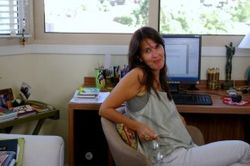Martha Medeiros | |
|---|---|
 | |
| Born | August 20, 1961 Porto Alegre, Brazil |
| Occupation | Writer and journalist |
| Language | Portuguese |
| Genre | Novel, chronic |
| Years active | 1985–present |
| Notable works | A Morte Devagar, (2000) Divã, (2002) |
Martha Medeiros (born August 20, 1961, in Porto Alegre) is a Brazilian writer and journalist. She works as columnist of the Zero Hora and O Globo newspapers. [1]